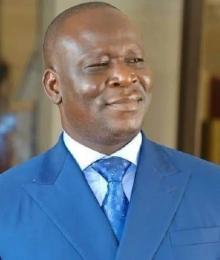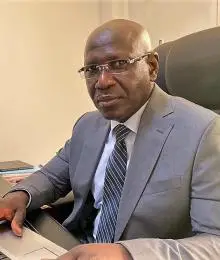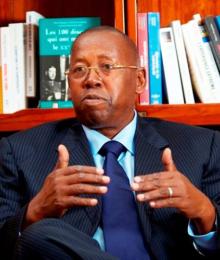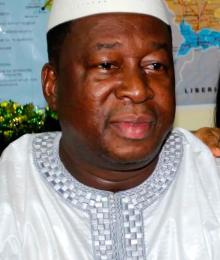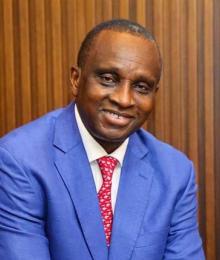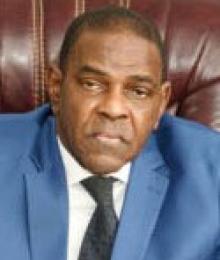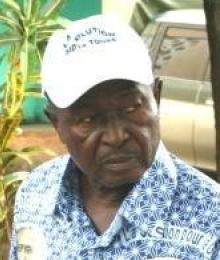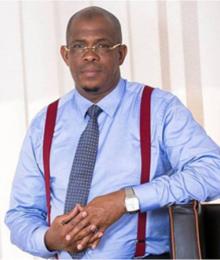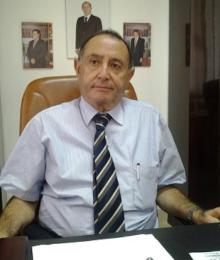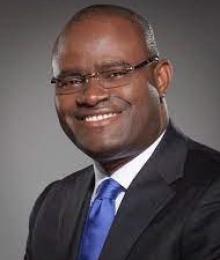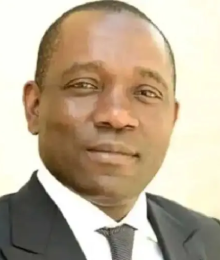
Aboubacar Dinah Sampil, better known as Bouba Sampil, is a prominent Guinean businessman and sports executive. As CEO of Nimba Mining, he has also made a name for himself in the world of football, serving as president of AS Kaloum since 2013, where he notably invested in the renovation of the Stade de la Mission.
With 35 years of experience leading various Guinean football clubs, this veteran sports executive was elected president of the Guinean Football Federation (FGF) on January 6, 2024, after previously serving on the Marketing and Communications Committee of the West African Football Union (WAFU) Zone A. His term at the FGF, driven by ambitions to modernize infrastructure and improve governance, was nonetheless marred by controversies over his management, culminating in his provisional dismissal by the executive committee in April 2025, just fifteen months into his tenure.
Introduction
Aboubacar Dinah Sampil, better known as Bouba Sampil, is an emblematic figure in Guinea's economic and sporting landscape. A prosperous businessman, finance expert, and passionate football executive, he embodies the new generation of African leaders seeking to transform their sectors through innovative vision and rigorous management.
Professional Background
Born in Guinea, Bouba Sampil first distinguished himself in the business and finance world before entering the universe of football. As CEO of Nimba Mining, a major mining company, he successfully grew his economic activities while nurturing a growing passion for the beautiful game.
His journey in football truly began in 2013 when he took over the presidency of AS Kaloum, one of Guinea's most prestigious clubs, succeeding Baidy Aribot. From his arrival, he demonstrated his commitment to developing sports infrastructure by investing approximately €702,000 in renovating the Stade de la Mission, the venue that hosts his club.
What distinguishes Bouba Sampil from many other executives is his exceptional experience in sports management. With 35 years of experience leading various Guinean clubs, including Olympique de Coyah, COK de Boké, Hafia FC, and of course AS Kaloum, he is considered the dean of Guinean football executives.
Rise to the FGF Presidency
After proving himself at the helm of AS Kaloum, Bouba Sampil broadened his horizons by joining the West African Football Union (WAFU Zone A). In April 2023, he was appointed to the Marketing and Communication Commission of this regional organization, a recognition of his skills in sports management and communication.
Bolstered by this new international legitimacy, he entered the race for the presidency of the Guinean Football Federation (FGF) in 2023. His candidacy was officially announced on October 28, 2023, when he was designated as the head of the Collective for the Defense of Guinean Football (CDFG) list.
During his campaign, Bouba Sampil presented an ambitious program built around three main axes:
- Improving the competitiveness of Guinean football by developing and implementing national regulations for club licensing, promoting youth championships, and organizing regular competitions.
- Improving football governance by providing the federation with an updated administrative and financial procedures manual and implementing training programs for all football stakeholders.
- Contributing to the improvement of sports infrastructure by supporting the state in its policy of building and rehabilitating modern stadiums, and developing centers of excellence throughout the country.
His unifying discourse and clear vision for the future of Guinean football allowed him to win the election on January 6, 2024, with 37 votes out of 65 statutory members, ahead of his opponents Almamy Saidou Sylla (28 votes) and Abdoul Karim Bangoura (0 votes). This victory marked the end of a turbulent period for Guinean football, which had been under the supervision of a Normalization Committee for two years.
Presidency Between Ambitions and Challenges
From the moment he took office, Bouba Sampil began implementing his program. In February 2024, he started his first field mission in Kindia, demonstrating his desire to be close to the realities of local football.
However, his presidency has not been without difficulties. From the first few months, tensions appeared within the FGF executive committee. Some members accused him of unilateral management and lack of transparency. The death of Salifou Camara, known as "Super V," former FGF president who had supported him during his election, seemed to further weaken his position.
In August 2024, the situation worsened when he was accused by some executive committee members of statutory violations and opacity in financial management. The vice-president in charge of youth football, Sory Doumbouya, filed an official complaint against him on July 1, 2024, for "conflicts of interest, influence peddling, match manipulation, and abuse of power," particularly regarding a match between AS Kaloum and Milo FC of Kankan.
Facing these accusations, an ad hoc investigation commission was established to investigate these allegations. Additionally, Bouba Sampil saw his decisions to co-opt for vacant positions within the executive committee canceled by the FGF Electoral Appeals Commission, which ruled that he had exceeded his prerogatives.
These internal difficulties were compounded by sporting problems, with the failure of the Syli National, the Guinean national team, to qualify for the Africa Cup of Nations, as well as poor performances by youth teams.
Contested Financial Management
On the financial front, Bouba Sampil faced accusations of lack of transparency. During an interview with RTG in April 2025, he defended his management by explaining that the FGF receives $1.25 million annually from FIFA for its operations, but monthly expenses amount to $107,000, plus the costs of organizing League 1 (12 billion Guinean francs) and repaying an inherited debt of 12 billion.
A conflict also erupted with Guicopres, a major sponsor of Guinean football, led by the wealthy businessman KPC. Bouba Sampil claimed that Guicopres owed 23 billion to the federation, which provoked KPC's discontent and the suspension of the partnership.
Turning Point of April 2025
On April 5, 2025, Bouba Sampil participated in RTG's Sport-Débat program, where he called for "a new start" and "a new project" for Guinean football. He acknowledged the difficulties encountered but attributed the internal crisis to the new list-based electoral system, which allegedly altered the balances within the federation.
A few days later, on April 8, 2025, a crucial meeting of the executive committee was held at the FGF headquarters. Bouba Sampil left this meeting, calling it "illegal" and claiming it had been canceled by a letter from the Minister of Sports. However, the seven remaining executive committee members unanimously voted for his provisional removal, pending the next FGF general assembly scheduled for May 2025. Sory Doumbouya, vice-president and chairman of Milo FC, was appointed as interim president.
Contrasting Legacy
Despite this tumultuous end to his term, Bouba Sampil remains an important figure in Guinean football. His experience of more than three decades in club management and his vision for the development of football in Guinea have left a mark on the national football landscape.
His journey illustrates the challenges of sports governance in Africa, where ambitions for modernization and professionalization often collide with structural, political, and financial realities. Bouba Sampil attempted to bring an entrepreneurial approach to Guinean football management, emphasizing infrastructure development, youth training, and good governance.
Though his FGF presidency ended prematurely, his impact on Guinean football remains significant. His case underscores the importance of transparent, inclusive governance that respects statutes to ensure the stability and sustainable development of sports institutions in Africa.
Ultimately, Bouba Sampil remains a key player in Guinean football, whose journey, between successes and controversies, reflects the complexities and challenges of contemporary African sport.











